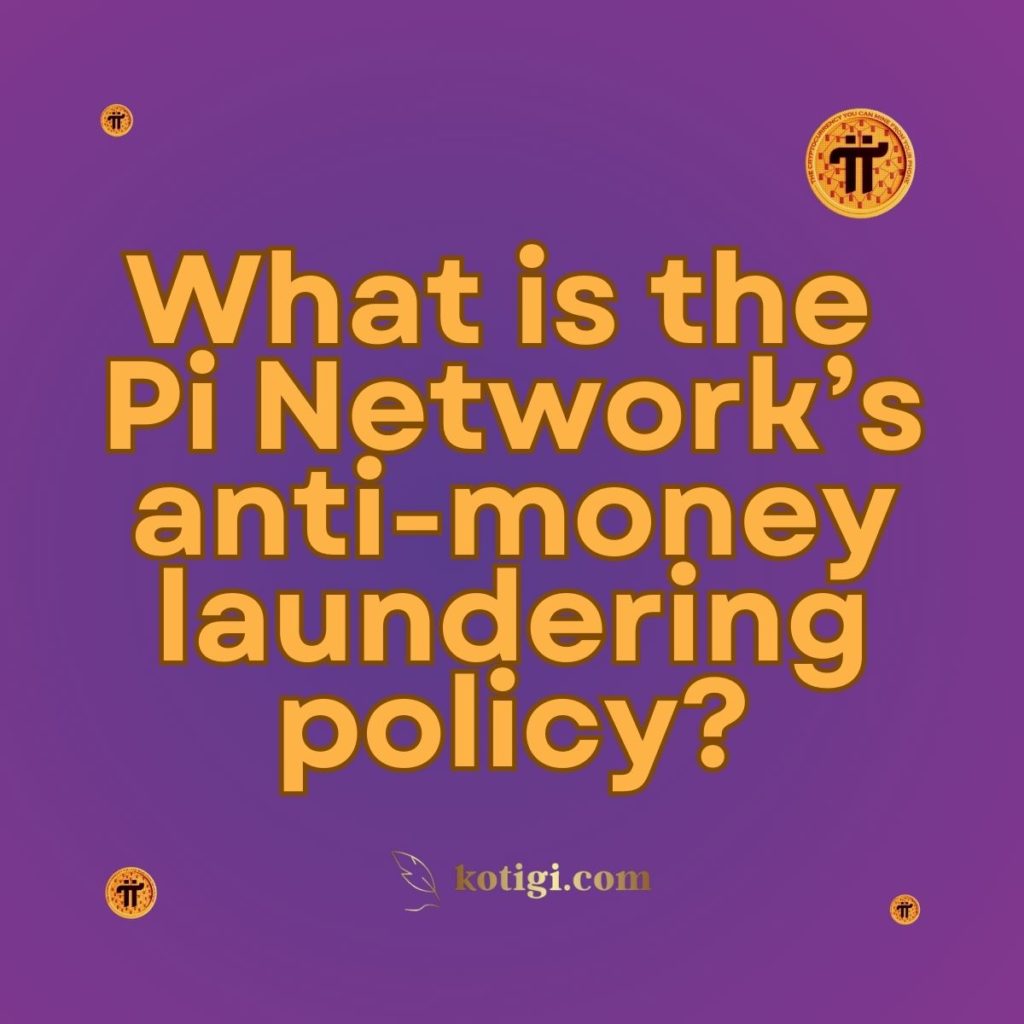
What is the Pi Network’s anti-money laundering policy?
The Pi Network’s anti-money laundering (AML) policy is designed to prevent illicit activities by implementing user verification processes, monitoring transactions for suspicious behavior, and adhering to global regulatory standards. This proactive approach helps ensure a secure and trustworthy environment for all users on the platform.
Introduction
As the cryptocurrency landscape evolves, anti-money laundering (AML) policies have become increasingly crucial for platforms like Pi Network. Given the decentralized nature of cryptocurrencies, they can be vulnerable to misuse for illegal activities such as money laundering and fraud. Therefore, an effective AML policy not only protects the integrity of the platform but also fosters user trust. This article will explore the components of the Pi Network’s AML policy, its implementation, and its significance in promoting a secure ecosystem for its users.
Understanding Anti-Money Laundering (AML)
The Importance of AML Policies
Anti-money laundering policies are vital for financial institutions and cryptocurrency platforms to prevent the illegal movement of money derived from criminal activities. AML measures ensure that organizations take necessary precautions to detect, deter, and report suspicious activities that could indicate money laundering or other financial crimes.
In the cryptocurrency sector, where anonymity can often obscure the origins of funds, a robust AML policy is essential. It safeguards the platform from being exploited by criminals and reinforces the legitimacy of the cryptocurrency market.
The Challenge of Implementing AML in Cryptocurrency
The decentralized and often pseudonymous nature of cryptocurrencies presents unique challenges in implementing effective AML measures. Unlike traditional financial systems, where transactions are closely monitored, cryptocurrencies can facilitate anonymous transactions that are harder to trace.
For platforms like Pi Network, this means adopting innovative strategies to balance user privacy with regulatory compliance. The goal is to create a secure environment where users can engage without the threat of fraud or illicit activities.
Key Components of Pi Network’s AML Policy
User Verification and KYC Process
A cornerstone of Pi Network’s AML policy is its Know Your Customer (KYC) process. KYC involves verifying the identity of users to ensure they are legitimate individuals rather than anonymous entities that could engage in illicit activities.
To complete the KYC process, users are required to submit personal information, such as government-issued identification and proof of address. This information is reviewed and verified by the Pi Network team. By implementing KYC, Pi Network can reduce the risk of fake accounts and ensure that its user base consists of real individuals.
Transaction Monitoring
Monitoring transactions for suspicious behavior is another key aspect of Pi Network’s AML policy. The platform employs advanced algorithms and monitoring tools to track user transactions and detect any unusual patterns that could indicate money laundering.
This monitoring involves analyzing transaction sizes, frequencies, and the relationships between different accounts. If any suspicious activities are detected, the platform can take immediate action, such as freezing accounts or reporting the incidents to relevant authorities.
Reporting Suspicious Activities
In accordance with global regulatory standards, Pi Network has established protocols for reporting suspicious activities. When a potential case of money laundering is detected, the platform is obligated to report it to the appropriate authorities, depending on the jurisdiction in which it operates.
By maintaining a transparent reporting process, Pi Network demonstrates its commitment to complying with regulations and contributing to the fight against financial crime. This not only protects the platform but also enhances user trust in its operations.
Education and Awareness
User Education on AML Policies
An essential component of Pi Network’s AML policy is educating users about the importance of compliance and the risks associated with money laundering. The platform provides resources and information to help users understand their responsibilities when using the network.
By raising awareness of the potential dangers of money laundering and the significance of regulatory compliance, Pi Network empowers its users to play an active role in maintaining a secure environment.
Community Reporting Mechanisms
To foster a collaborative effort in preventing money laundering, Pi Network encourages its users to report any suspicious activities they encounter on the platform. This community-driven approach creates an additional layer of security and helps the platform identify potential threats more effectively.
Users can report suspicious behavior through the Pi app, allowing the platform to respond quickly to any concerns. This system promotes a sense of accountability and vigilance among users, reinforcing the importance of maintaining a secure ecosystem.
Compliance with Global Regulations
Adhering to International Standards
Pi Network’s AML policy is designed to align with international regulations and standards. This includes compliance with guidelines set by organizations such as the Financial Action Task Force (FATF) and local regulatory bodies in the jurisdictions where it operates.
By adhering to these standards, Pi Network not only protects itself from legal repercussions but also enhances its credibility in the cryptocurrency market. Users can feel confident knowing that the platform is committed to maintaining high compliance standards.
Adapting to Evolving Regulations
As regulatory frameworks surrounding cryptocurrencies continue to evolve, Pi Network remains vigilant in adapting its AML policy to comply with new requirements. The platform closely monitors regulatory developments and updates its processes accordingly.
This proactive approach ensures that Pi Network remains compliant with changing regulations while also reinforcing its commitment to combating money laundering and other financial crimes.
Future Developments in Pi Network’s AML Policy
Continuous Improvement
The Pi Network team is dedicated to continuously improving its AML policy. This involves assessing the effectiveness of existing measures, identifying potential gaps, and implementing new strategies to enhance security.
By regularly reviewing its AML practices, Pi Network can adapt to the dynamic nature of the cryptocurrency landscape and ensure that it remains a safe platform for users.
Embracing Technological Advancements
As technology continues to evolve, Pi Network plans to leverage advanced tools and technologies to strengthen its AML efforts. This includes exploring innovative solutions such as artificial intelligence and machine learning to enhance transaction monitoring capabilities.
By embracing technological advancements, Pi Network can improve its ability to detect and prevent money laundering, ultimately creating a more secure environment for its users.
Conclusion
The Pi Network’s anti-money laundering policy is a critical component of its commitment to security and regulatory compliance. Through user verification, transaction monitoring, and education, the platform effectively mitigates the risks associated with money laundering. As the cryptocurrency landscape continues to evolve, Pi Network remains dedicated to enhancing its AML practices to ensure a safe and trustworthy environment for its users.
Key Takeaways
- The Pi Network’s AML policy is essential for preventing illicit activities and ensuring regulatory compliance.
- KYC processes help verify user identities, reducing the risk of fake accounts.
- Transaction monitoring and reporting suspicious activities are key aspects of the AML policy.
- User education and community reporting mechanisms foster accountability and vigilance.
- The platform continuously adapts its AML practices to align with global regulations and technological advancements.




